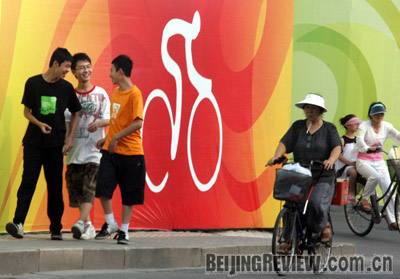|

PEOPLE POWERED: Walking and cycling are making a comeback in Beijing after the Olympic Games host city introduced temporary car restrictions
I live in an apartment block at a busy intersecting crossroads of Chegongzhuang Road, west Beijing, and recently have noted my sleeping patterns have improved. I suspect this may be the slumbering heat of the summer intensifying, but another possible reason could be the new quiet of the morning. Since the new traffic enforcement was introduced, the six lanes of traffic on the one road, and eight on the other, have reduced visibly. Having only recently moved into my place, I was spellbound at first by the masses walking along the streets at 8:30 a.m. I was sure it wasn't typical of the previous few weeks. Indeed, pedestrian footfall has increased, as has the number of cyclists. I'm sure of it.
The 45 percent reduction in car traffic through the temporary measures (for the duration of the Olympics and Paralympics) is achieved by such a simple plan, and yet has such an effective result. On odd days of the month, car license plates ending with an odd number can travel, and vice-versa for even ones. I can't help wondering whether this plan is being pushed by local environmentalists to be kept in place after the Olympics have finished.
The major advantage for Beijing in implementing such a plan is that the city already has a network of ready-made cycle paths, possibly second to none in number to any other major city in the world. What's more, the city is as flat as a pancake, making it a comfortable means of getting around. The bicycle has always been an ingrained means of transport here, so for Beijingers it was simple enough to oil up their bikes and pump up their tires when the scheme was introduced.
Think of the positives of this scheme: The benefits to health by using bicycles and walking, the ease on traffic congestion, the effects on air and noise pollution, the impact on energy consumption of removing up to 1 million cars from the city streets. Not only does this scheme work, it is also--I'm sure--an unprecedented measure worldwide. When all the talk internationally is of energy crisis, and the world's eyes are on Beijing, what a unique and timely opportunity to set an example to other nations this policy represents.
To try to reduce inner-city traffic, London has a widely criticized "congestion charge" that is seen by many in the middle classes and media as a government fundraising tax. It works to a degree: It helps cut cars in central London, and makes people question their reliance on their cars. But it also fails people because the fee is hugely expensive to the average worker entering the congestion zone, but a drop in the ocean to the inhabitants of the wealthy area it contains. It also offers none of the alternatives that the Beijing Municipal Government has: Public transport facilities and services here have been extended and improved, and, as I mentioned before, cycling networks are already widely in place here, and bicycles are cheap. You could even argue that cycling etiquette is respected on the streets here above London.
A new system in Paris tries to encourage people to use bicycles, both as a means to encourage exercise for city people and to ease pollution and congestion. They have installed bike depots at points around the capital that with the swipe of a credit card can be leased for a day and deposited securely elsewhere. A similar system operates in various British cities, except that no credit card is needed, just a tool to break off the lock, and the "borrowed" bikes are seldom seen again.
I suggest that if people object to the Beijing policy of reducing traffic, it will be because of businesses suffering: the average delivery person, say, or construction workers who need their vehicles for work. The point in such schemes should be for us to question what constitutes a necessary journey in a car. If tradesmen really need to use their vehicles, then perhaps permits can be bought on a monthly basis for the banned days. In other countries, car sharing for same journeys is becoming common, with companies rewarding staff practicing the concept. Similar schemes would become popular here, I'm sure.
All in all, something needs to be done about the energy crisis, pollution and traffic, and this policy goes some way to alleviating those problems. It's clear to me that the lowering in noise and air pollution particularly would be welcomed by Chinese residents, so the humble bicycle repair man in the street will not be the only person grateful to see the law enforced beyond the Olympics duration.
The author is British and lives and works in Beijing |